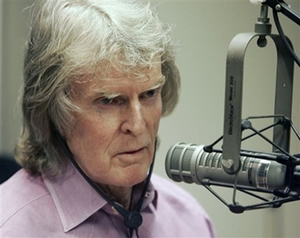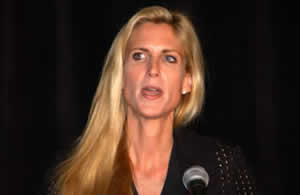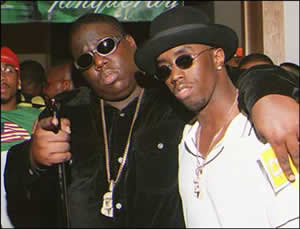Any Person, Every Nation:
"Even the Gentiles"
For Sunday May 6, 2007
Lectionary Readings (Revised Common Lectionary, Year C)
Acts 11:1–18
Psalm 148
Revelation 21:1–6
John 13:31–35
 |
Don Imus. |
When radio shock jock Don Imus disparaged the women of the Rutgers basketball team as "nappy-headed hos," and Ann Coulter attacked John Edwards as a "faggot," their defenders appealed to their rights of free speech. Fair enough. But too much violence today has its roots in hate speech like theirs that appeals to identity caricatures. The same could be said for political rhetoric like Ayatollah Khomeini's reference to America as "the great satan," or Bush's categorization of Iraq, Iran, and North Korea as an "axis of evil." Ditto for the vulgarity and misogyny of gangsta rap lyrics.
So-called "elimination rhetoric" poisons our public discourse, and partitions people and civilizations into binary oppositions. Common sense tells us that people enjoy plural identities, or what the Nobel laureate Amartya Sen has called "diverse diversities." To understand someone, we must consider factors of civilization, religion, nationality, class, community, culture, gender, profession, language, politics, morals, family of origin, skin color, and a multitude of other influences. Contrary to Samuel Huntington's thesis about the "clash of civilizations," we should resist the insinuation that we are fated to hate.
Christian anti-Semitism is far too common today, but the reading from Acts this week shows how roles were reversed in the early Christian movement. The question back then was not the marginalization of Jews, but whether and how Gentiles might experience God's grace along with "Israel, the people close to God's heart" (Psalm 148:11). Even when open-minded Jewish followers of Jesus agreed that Gentiles could enjoy God's favor, some of the more zealous ones wanted to require new Gentile believers to obey the Mosaic law (Acts 15:1ff, 21:20). This pressure to Judaize the Gentile believers was so strong that even after learning his lesson in this week's story about the Roman centurion Cornelius, Peter lapsed into hypocrisy and so Paul publicly rebuked him (Galatians 2:12).
When God instructed Peter in a vision to eat impure and unclean foods, his first impulse as a conscientious Jew was, "Surely not, Lord! I have never eaten anything impure or unclean" (10:14). After he obeyed God to meet and eat with the Gentile soldier Cornelius, and observed the same grace of God in a person so otherwise different from himself, the Jewish believers criticized Peter: "You went into the house of uncircumcised men and ate with them" (11:3). Peter had to defend his embrace of the Gentiles.
 |
Ann Coulter. |
For a Jew of Peter's time and place, dietary restrictions designated what food you ate and who you ate it with. They comprised only a small part of a comprehensive holiness code that regulated personal and community life for the Hebrew people 3,500 years ago. By one count there are 613 mizvot or "commandments" in the five books of Moses (the Torah). The purity laws of Leviticus chapters 11–26 specify in minute detail clean and unclean foods, purity rituals after childbirth or a menstrual cycle, regulations for skin infections and contaminated clothing or furniture, prohibitions against contact with a human corpse or dead animal, instructions about nocturnal emissions, laws regarding bodily discharges, agricultural guidelines about planting seeds and mating animals, and decrees about lawful sexual relationships, keeping the sabbath, forsaking idols, and even tattoos. These purity laws encompassed every aspect of being human—birth, death, sex, gender, health, economics, jurisprudence, social relations, hygiene, marriage, behavior, and certainly ethnicity, for Gentiles were automatically considered impure.
Given our propensity for justifying ourselves and for scape-goating others, the purity laws lent themselves to a spiritual stratification or hierarchy between the ritually "clean" who considered themselves close to God, and the "unclean" who were shunned as impure sinners far from God. Instead of expressing the holiness of God, ritual purity became a means of excluding people considered dirty, polluted, or contaminated. In word and in deed Jesus ignored, disregarded and perhaps even actively demolished these distinctions of ritual purity as a measure of spiritual status. And as Peter learned in his encounter with Cornelius, Jesus asked him to do the same.
In contrast to the purity system with its "sharp social boundaries" (Borg), the emergent Christian movement substituted a radically alternate social vision. The new community that Jesus announced would be characterized by interior compassion for everyone, not external compliance to a purity code, by radical inclusivity rather than by hierarchical exclusivity, and by inward transformation rather than by outward ritual. In place of "be holy, for I am holy" (Leviticus 19:2), says Marcus Borg, Jesus deliberately substituted the call to "be merciful, just as your Father is merciful" (Luke 6:36, my emphasis).
God, Peter learned, is not a God of partiality or favoritism. He warmly welcomes every person from any nation. The good news that was "sent to the people of Israel," said Peter, was that the grace of God was clearly given "even to the Gentiles." If the God of all creation did not exclude Cornelius and the Gentiles as impure or unclean, Peter realized that neither could he (10:34, 36, 45).
In Ephesians Paul makes a play on words that echoes Peter's thinking. God, says Paul, is the patera of every patria—the "father (patera) from whom every family (patria) derives its name" (1:14–15). God is not the God of Jews alone, or the God only of Christians, but rather the "father of all fatherhood," the "father of every family," or the "father of the whole human family." He is the God of Muslims, Buddhists, and atheists. In a curious phrase that I find more mysterious than obvious, Paul expands God's patrilineage even further to embrace "every family in heaven and on earth."
Conversely, just as God is every person's father, so every human being is his child. To those who partition people according to ethnicity, economic class, or gender, Paul writes that in Christ "there is neither Jew nor Greek, slave nor free, male nor female" (Galatians 3:28). To those who limit God's lavish love to the morally upright, Matthew says that God "makes his sun rise on the evil and the good, and sends rain on the righteous and the unrighteous" (5:45). Whether gay or straight, Republican or Democrat, Christian or wikkan, wealthy entrepreneur whom you envy or beggar bum on the street who repulses you, Paul quotes a pagan poet to affirm that every person is God's "offspring" (Acts 17:28).
 |
Rappers Biggie Smalls and Puff Daddy. |
In his bestseller Velvet Elvis, pastor Rob Bell of Mars Hill church in Grand Rapids, Michigan, reminds us that the Christian gospel is good news about God's fatherly favor to every human being and to all of creation, "especially for those who don't believe it. . . The church must stop thinking about everybody primarily in categories of in or out, saved or not, believer or nonbeliever. Besides the fact that these terms are offensive to those who are the 'un' and 'non,' they work against Jesus's teaching about how we are to treat others. . . As the book of James says, 'God shows no favoritism.' So we don't either" (James 2:1–13).
I've found it a humbling exercise to ask what categories of people I sanctimoniously spurn as impure, unclean, dirty, contaminated, and, in my mind, as far from God. If Peter had his Cornelius, what is my modern equivalent? Maybe Rudy Giuliani and his wife who between them have been married six times? Or greedy executives, lazy welfare recipients, Republicans who lied us into a catastrophic war, or even Don Imus and Ann Coulter? How have I distorted the self-sacrificing, egalitarian love of God into self-serving, exclusionary elitism? What boundaries do I wrongly build or might I bravely shatter? I pray to follow Peter's obedience and experience what Borg calls a "community shaped not by the ethos and politics of purity, but by the ethos and politics of compassion."
For further reflection:
* Are there special categories of people you are tempted to exclude as "impure?"
* Is it right to privilege compassion over purity, or is that an artificial distinction?
* Can you think of modern equivalents to Peter's encounter with Cornelius?
* Consider Rob Bell, that the Gospel is good news "especially to those who don't believe it."
* Cf. Amartya Sen, Identity and Violence; The Illusion of Destiny.





